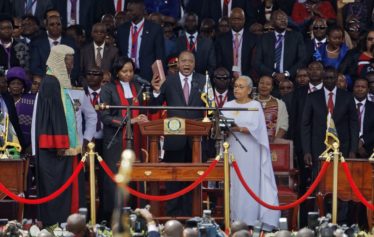
Sudan’s President Omar al-Bashir was in South Africa/AFP/GETTY IMAGES
South Africa Government Wants International Criminal Court (ICC) to Stop Interfering with Their Government
South Africa has formally begun the process of withdrawing from the International Criminal Court (ICC), notifying the UN of its decision.
South Africa did not want to execute ICC arrest warrants which would lead to “regime change,” a minister said. Last year, a South African court criticized the government for refusing to arrest Sudan’s President Omar al-Bashir. He is wanted by the ICC on charges of genocide and war crimes.
Bashir was attending an African Union summit in Johannesburg, when the government ignored an ICC request to arrest him. He denies allegations that he committed atrocities in Sudan’s troubled western Darfur region.
Several media outlets say they have obtained a copy of the “Instrument of Withdrawal,” signed by South Africa’s foreign minister.
“The Republic of South Africa has found that its obligations with respect to the peaceful resolution of conflicts at times are incompatible with the interpretation given by the International Criminal Court,” the document says.
Justice Minister Michael Masutha said at a press conference that the government would table legislation in parliament to withdraw South Africa from the ICC.
The Rome Statute, under which the ICC was set up, required the arrest of heads of state for whom a warrant was issued. The consequence of this would be “regime change” and the statute was incompatible with South African legislation which gave heads of state diplomatic immunity, he added.
The ICC has a notoriously fractious relationship with the African continent. Despite 34 African nations voluntarily signing up to the court’s jurisdiction, in recent years a handful of governments have decided their idea of international justice is incompatible with that set out in the Rome Statute.
When the Kenyan President Uhuru Kenyatta was charged with crimes against humanity, the African Union argued that heads of state should be entitled to immunity for the duration of their term in office, a direct contravention of the ICC’s raison d’etre to hold the most powerful to account. The trial against Kenyatta later collapsed because of a lack of evidence.
Read more here.


